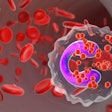
It will take more than a spoonful of Greek yogurt to improve asthma, but a new study shows there’s promise in probiotics. With this news comes the hope that physicians may soon consider incorporating probiotics into treatment plans for asthma patients, particularly those with suboptimal disease control.
The study, “Efficacy of Probiotics as Adjuvant Therapy in Bronchial Asthma: A Systematic Review and Meta-Analysis,” was published in Allergy, Asthma & Clinical Immunology. It analyzed data from 12 randomized controlled trials (RCTs) involving 1,401 participants, adhering to Preferred Reporting Items for Systematic reviews and Meta-Analyses (PRISMA) guidelines and recording data with the international prospective register of systemic reviews, PROSPERO.
According to the study’s authors, their research was designed to look at new treatments for reducing airway inflammation and exacerbations commonly associated with asthma. They discovered that probiotics, known for their role in gut health, are emerging as a potential adjunctive therapy for asthma through the gut-lung axis.
The study investigated various probiotic strains, including Lactobacillus and Bifidobacterium species. These probiotics are believed to modulate immune responses, reduce inflammation and strengthen the epithelial barrier in the gut and respiratory tract.
The meta-analysis revealed significant improvements in asthma control test scores following probiotic supplementation. The odds ratio (OR) for improved asthma control was 1.18, with a 95% confidence interval (CI) of 1.18–3.64, and a p-value of 0.0001. Additionally, one of the 12 studies reported fewer asthma exacerbations in the probiotic group compared to the placebo group.
Despite these promising results, the pooled data on fractional exhaled nitric oxide (FeNO) and eosinophil levels did not show statistically significant improvements. Lung function indices, such as forced expiratory volume in 1 second (FEV1) and peak expiratory flow rate (PEFR), also showed no significant impact from probiotic intervention.
Still, researchers said they remained hopeful that probiotics may be beneficial in improving asthma symptom control. The study calls for more controlled trials to investigate specific probiotic strains’ potential role in reducing asthma exacerbations and improving overall asthma management.
In the future, this research may offer clinicians an additional, natural therapeutic tool for asthmatic symptom control, they wrote.






















